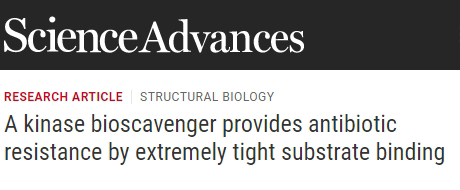Press-room / news / Science news /
A kinase bioscavenger provides antibiotic resistance by extremely tight substrate binding
Kinase-mediated phosphorylation represents one of the general strategies for the emergence of antibiotic resistance. A new subfamily of AmiN-like kinases, isolated from the Siberian bear microbiome, inactivates antibiotic amicoumacin by phosphorylation. The nanomolar substrate affinity defines AmiN as a phosphotransferase with a unique catalytic efficiency proximal to the diffusion limit. Crystallographic analysis and multiscale simulations revealed a catalytically perfect mechanism providing phosphorylation exclusively in the case of a closed active site that counteracts substrate promiscuity. AmiN kinase is a member of the previously unknown subfamily representing the first evidence of a specialized phosphotransferase bioscavenger.
june 26, 2020




